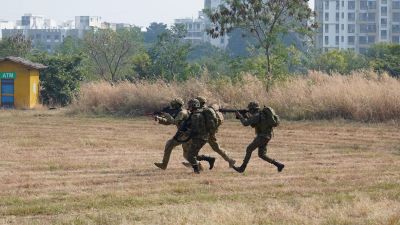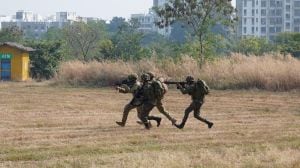Ayodhya on frontburner, Advani turns down heat
With the Allahabad High Court order coming a day after the terrorist attack on the makeshift temple in Ayodhya, BJP chief L K Advani took to...

With the Allahabad High Court order coming a day after the terrorist attack on the makeshift temple in Ayodhya, BJP chief L K Advani took to the streets to declare that the Ram temple issue—lying dormant for a long while—‘‘has once again come to life.’’
Though he repeated the 1990 Rath Yatra-era rhetoric, his two-minute speech at the ‘‘protest’’ demonstration in Delhi could neither paper over the disunity in Hindutva ranks nor quell the confusion in the BJP on their president’s ideological intentions.
The demonstration on Parliament Street this morning turned violent when unruly crowds of Bajrang Dal and VHP workers started throwing stones across the barricades at the police force, which retaliated with water cannons and tear gas shells.
While the Bajrang Dal-VHP members tried to break the barricades outside the Parliament Street police station, the BJP demonstration took place tamely at the other end. The BJP leaders, including Advani who climbed aboard the open truck that served as their podium, faced the other way—making the distinction between the VHP and BJP all too evident.
The stinging tear gas and steady rain made Advani keep his speech short and shrill. India, he said, had thousands of temples but the terrorists had chosen to attack the Ram temple because it was a symbol of ‘‘cultural nationalism.’’
The attack had brought the Ayodhya issue alive and the BJP believed in resolving the issue either through a court verdict or a mutual settlement between the two communities, he said. But either way, its commitment to building the temple at the disputed site (‘‘mandir wahin banayenge’’) remained unshakeable.
If yesterday’s attack served to strengthen the national resolve to build the temple, it would be a matter of immense good fortune (‘‘bahut bada saubhagya’’), he added, ending with the old cry of ‘‘Jai Shri Ram.’’
The recycling of old rhetoric notwithstanding, Advani’s refusal to attack Pakistan, his decision not to go to Ayodhya, nor announce any clear-cut campaign underlined that the BJP—or at least its chief—was not about to ‘‘revive’’ the Ram temple movement alongside the VHP, sources said. The party’s response to the HC order quashing the Rae Bareli court verdict discharging Advani in the Babri Masjid demolition case was also lukewarm.
BJP spokesman Prakash Javadekar said, ‘‘Our legal advisers will be studying the verdict and suggest necessary legal steps—whatever legal steps are required will be taken.’’
That the BJP leaders are willing to make the right noises about the Ayodhya attack but have no plans to go back to the 1990-92 campaign mode also became clear at a ‘‘tree plantation’’ function this morning to mark the 105th birth anniversary of Jana Sangh founder Shyama Prasad Mookerjee.
In his long speech on the occasion, Advani avoided the Ayodhya issue altogether and spoke exclusively on Mookerjee’s 1953 campaign to ‘‘integrate’’ Jammu & Kashmir with the rest of India.
Vajpayee did take up the issue but only to demand that the government ‘‘must answer’’ how the terrorists managed to reach so close to the makeshift temple. He underlined the need to remain ‘‘vigilant’’ against the continuing threats to ‘‘our independence’’ posed by terrorists.
But Vajpayee, like Advani at the street demonstration, also carefully avoided anti-Pakistan, anti-‘‘appeasement’’ rhetoric.
Respect the law: Congress
NEW DELHI: Stopping short of demanding L K Advani’s resignation as Opposition leader in the Lok Sabha, the Congress today said that the HC order vindicated the party stand that ‘‘every effort had been made to scuttle the process of law to go soft on Advani’’. Spokesperson Anand Sharma said, ‘‘Law must be respected and all should abide by the judicial process.’’ ENS





- 01
- 02
- 03
- 04
- 05


























